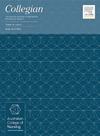为养老院的护士和家人/朋友试用一款通信应用程序
IF 1.7
4区 医学
Q2 NURSING
引用次数: 0
摘要
有效的沟通是高质量治疗关系和信任发展的基础。养老院的护士时间有限,这对他们与住客家人/朋友持续沟通的能力产生了负面影响,不利于建立有效的关系。Brenna应用程序(brenna.com.au)旨在促进护士和老年护理居民的家人/朋友之间的有效沟通和支持积极的关系。目的评估护士和家人/朋友使用Brenna应用程序的体验。方法在澳大利亚新南威尔士州一个区域城市的168个床位的住宅老年护理机构进行了定量描述性试点研究。2024年4月至5月期间进行了定制的在线李克特量表调查。结果:50名家人/朋友“同意”Brenna应用更新和新闻公告很有用,Brenna易于使用,有助于清晰的沟通,但他们对Brenna促进信任和提高他们对护理的满意度持中立态度。护理人员(n = 11)“同意”或“非常同意”布伦纳有助于减轻压力、改善沟通和节省时间。对护士数据输入的改进将进一步提高家人/朋友的用户体验。结论本研究强调科技的使用可以促进老年护理护士与住客家人/朋友之间的沟通。护士和家人/朋友对这项技术的操作存在一些不同的偏好。对实践的启示护士发现基于应用程序的沟通有助于改善与家人的沟通,节省时间,减轻压力。家人/朋友认为基于应用程序的交流在特定情况下是一种有用的交流机制。本文章由计算机程序翻译,如有差异,请以英文原文为准。
Piloting a communication app for nurses and family/friends in residential aged care
Background
Effective communication underpins quality therapeutic relationships and the development of trust. Nurses in residential aged care are time-poor, which negatively impacts their ability to communicate consistently with residents’ family/friends, a situation detrimental to building effective relationships. The Brenna app (brenna.com.au) aims to facilitate efficient communication and support positive relationships between nurses and aged care residents’ family/friends.
Aim
To evaluate nurses and family/friends’ experience of using the Brenna app.
Methods
A quantitative descriptive pilot study was conducted within a 168-bed residential aged care facility in a regional city in New South Wales, Australia. Bespoke online Likert scale surveys were administered between April and May 2024.
Results
Family/friends (n = 50) ‘agreed’ that the Brenna app updates and news announcements were useful, that Brenna was easy to use and helped with clear communication, but they were neutral on Brenna promoting trust and improving their satisfaction with care. Nursing staff (n = 11) ‘agreed’ or ‘strongly agreed’ that Brenna was helpful in reducing stress, improving communication, and saving time. Improvements to data entry from nurses would further enhance the family/friends user experience.
Conclusion
The study highlights that the use of technology can facilitate improved communication between aged care nurses and residents’ family/friends. Some different preferences between nurses and family/friends in the operationalisation of this technology exists.
Implications for practice
Nurses found app-based communication to be helpful in improving communication with family members, saving time, and reducing stress. Family/friends identified app-based communication as a useful mechanism for communication in specific situations.
求助全文
通过发布文献求助,成功后即可免费获取论文全文。
去求助
来源期刊

Collegian
NURSING-
CiteScore
2.70
自引率
6.70%
发文量
127
审稿时长
72 days
期刊介绍:
Collegian: The Australian Journal of Nursing Practice, Scholarship and Research is the official journal of Australian College of Nursing (ACN).
The journal aims to reflect the broad interests of nurses and the nursing profession, and to challenge nurses on emerging areas of interest. It publishes research articles and scholarly discussion of nursing practice, policy and professional issues.
Papers published in the journal are peer reviewed by a double blind process using reviewers who meet high standards of academic and clinical expertise. Invited papers that contribute to nursing knowledge and debate are published at the discretion of the Editor.
The journal, online only from 2016, is available to members of ACN and also by separate subscription.
ACN believes that each and every nurse in Australia should have the opportunity to grow their career through quality education, and further our profession through representation. ACN is the voice of influence, providing the nursing expertise and experience required when government and key stakeholders are deciding the future of health.
 求助内容:
求助内容: 应助结果提醒方式:
应助结果提醒方式:


